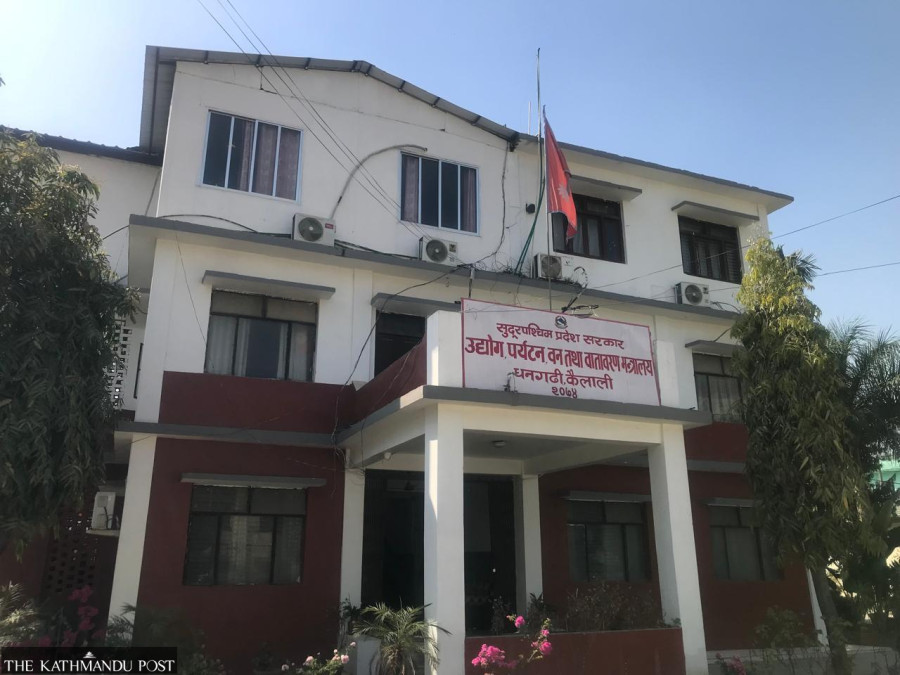Sudurpaschim Province
Sudurpaschim audio leak reveals big corruption in forestry
Leaked conversation exposes efforts to fast-track sal logging. Accused minister admits to chat and quits, but calls it a political attack by rivals.
Arjun Shah
Sudurpaschim province’s Minister for Industry, Tourism, Forest and Environment Laxman Kishore Chaudhary was forced to resign on Saturday after an audio recording surfaced, exposing his involvement in a scheme with timber smugglers to harvest sal (shorea robusta) trees for financial gain. The leaked conversation, which emerged about a week ago, revealed that Chaudhary was in discussions with former forest minister and CPN-UML politburo member Narad Muni Rana, along with several unnamed timber traders, to orchestrate a large-scale deforestation in an organised manner.
Following the scandal, Chief Minister Kamal Bahadur Shah instructed Chaudhary, who represented Nagarik Unmukti Party in the provincial Cabinet, to step down. Chaudhary has since admitted to the conversation but claimed that it took place in August last year, long before he assumed office. He argued that the leaked discussion was being used against him due to internal factional disputes within his party.
The leaked audio conversation reportedly centred on expediting the formulation of guidelines to facilitate the logging of sal trees. However, it remains unclear whether the guidelines in question pertained to sustainable forest management or private forestry regulations.
Sources suggest that the discussions aimed at legalising logging and sale of sal trees from private forests. The audio recording indicates that former minister Rana played a key role as an advisor and facilitator. Rana, who also serves as UML’s district in-charge for Kailali, was heard instructing Chaudhary to replicate Lumbini province’s forestry guidelines, by merely replacing “Lumbini” with “Sudurpaschim” to fast-track the approval process. Rana also reportedly coaxed Chaudhary, saying, “You and I need to contest elections again. We need money to win.”
Chaudhary was also heard saying that Chief Minister Shah, Nagarik Unmukti Party founder Resham Chaudhary and party chair Ranjita Shrestha should also be brought on board. The conversation also touched upon a financial deal amounting to Rs3 million.
In response to the allegations, UML leader Rana denied any financial involvement. “I only discussed policy matters. There was no mention of financial transactions,” said Rana at a press conference on Tuesday.
The provincial Ministry of Industry, Tourism, Forest and Environment had drafted a set of guidelines titled “Utilisation and Monitoring of Sal Trees in Registered Private Forests-2024.” According to sources, the leaked conversation pertained to the development of these very guidelines.
The draft was submitted to the provincial Ministry of Internal Affairs and Law, as well as the provincial Ministry of Economic Affairs, for feedback in November, 2024. The Ministry of Internal Affairs approved it in December, while the Economic Affairs Ministry gave its nod in January this year. Following these approvals, the guidelines draft was officially registered with the Chief Minister’s Office on January 8. However, the Chief Minister’s Office has yet to endorse it.
“We have put it on hold due to increasing pressure from various quarters,” said Chief Minister Shah.
Previously, only fallen and dead Sal trees from community forests could be logged. However, on November 23, 2023, the federal Ministry of Forest and Environment issued a notice in the Nepal gazette allowing private landowners to cut, use, transport and sell sal trees grown on registered private forests. While the provision required provincial governments to oversee the process, allegations have surfaced that this regulatory framework was manipulated for financial gain.
Sources claim that the same group responsible for pushing this policy at the federal level aimed to extend it across all seven provinces to enable unchecked logging under the guise of private forestry. Environmental activists fear that this move could lead to rampant deforestation.
The Sudurpaschim Province’s draft guidelines included provisions allowing landowners to apply to local governments for permission to cut sal trees. If the local authority delayed or refused approval, district-level Division Forest Office representatives could override them. The same provision applied to trees growing on public or unregistered lands adjacent to private property.
Forest conservationists argue that legalising sal logging will accelerate deforestation. “Illegal logging is already depleting our forests. If private landowners are granted unrestricted logging rights, timber smugglers will exploit the system and plunder forests,” said Karan Rawal, Kailali Chairman of the Federation of Community Forestry Users Nepal.
Rawal further claimed that timber traders had long influenced government policies on sustainable forest management and timber trade.
The scandal has once again highlighted deep-rooted corruption in Nepal’s forestry sector, where politicians, bureaucrats and business interests often collaborate to exploit natural resources. With the resignation of Chaudhary, the spotlight is now on Chief Minister Shah’s government to address these allegations and ensure accountability in forest management.




 31.12°C Kathmandu
31.12°C Kathmandu













